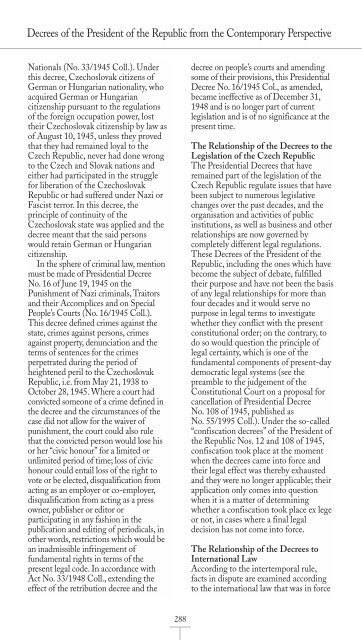the nationality of all inhabitants of the czech provinces and ...
the nationality of all inhabitants of the czech provinces and ...
the nationality of all inhabitants of the czech provinces and ...
Create successful ePaper yourself
Turn your PDF publications into a flip-book with our unique Google optimized e-Paper software.
Decrees <strong>of</strong> <strong>the</strong> President <strong>of</strong> <strong>the</strong> Republic from <strong>the</strong> Contemporary Perspective<br />
Nationals (No. 33/1945 Coll.). Under<br />
this decree, Czechoslovak citizens <strong>of</strong><br />
German or Hungarian <strong>nationality</strong>, who<br />
acquired German or Hungarian<br />
citizenship pursuant to <strong>the</strong> regulations<br />
<strong>of</strong> <strong>the</strong> foreign occupation power, lost<br />
<strong>the</strong>ir Czechoslovak citizenship by law as<br />
<strong>of</strong> August 10, 1945, unless <strong>the</strong>y proved<br />
that <strong>the</strong>y had remained loyal to <strong>the</strong><br />
Czech Republic, never had done wrong<br />
to <strong>the</strong> Czech <strong>and</strong> Slovak nations <strong>and</strong><br />
ei<strong>the</strong>r had participated in <strong>the</strong> struggle<br />
for liberation <strong>of</strong> <strong>the</strong> Czechoslovak<br />
Republic or had suffered under Nazi or<br />
Fascist terror. In this decree, <strong>the</strong><br />
principle <strong>of</strong> continuity <strong>of</strong> <strong>the</strong><br />
Czechoslovak state was applied <strong>and</strong> <strong>the</strong><br />
decree meant that <strong>the</strong> said persons<br />
would retain German or Hungarian<br />
citizenship.<br />
In <strong>the</strong> sphere <strong>of</strong> criminal law, mention<br />
must be made <strong>of</strong> Presidential Decree<br />
No. 16 <strong>of</strong> June 19, 1945 on <strong>the</strong><br />
Punishment <strong>of</strong> Nazi criminals, Traitors<br />
<strong>and</strong> <strong>the</strong>ir Accomplices <strong>and</strong> on Special<br />
People’s Courts (No. 16/1945 Coll.).<br />
This decree defined crimes against <strong>the</strong><br />
state, crimes against persons, crimes<br />
against property, denunciation <strong>and</strong> <strong>the</strong><br />
terms <strong>of</strong> sentences for <strong>the</strong> crimes<br />
perpetrated during <strong>the</strong> period <strong>of</strong><br />
heightened peril to <strong>the</strong> Czechoslovak<br />
Republic, i.e. from May 21, 1938 to<br />
October 28, 1945. Where a court had<br />
convicted someone <strong>of</strong> a crime defined in<br />
<strong>the</strong> decree <strong>and</strong> <strong>the</strong> circumstances <strong>of</strong> <strong>the</strong><br />
case did not <strong>all</strong>ow for <strong>the</strong> waiver <strong>of</strong><br />
punishment, <strong>the</strong> court could also rule<br />
that <strong>the</strong> convicted person would lose his<br />
or her “civic honour” for a limited or<br />
unlimited period <strong>of</strong> time; loss <strong>of</strong> civic<br />
honour could entail loss <strong>of</strong> <strong>the</strong> right to<br />
vote or be elected, disqualification from<br />
acting as an employer or co-employer,<br />
disqualification from acting as a press<br />
owner, publisher or editor or<br />
participating in any fashion in <strong>the</strong><br />
publication <strong>and</strong> editing <strong>of</strong> periodicals, in<br />
o<strong>the</strong>r words, restrictions which would be<br />
an inadmissible infringement <strong>of</strong><br />
fundamental rights in terms <strong>of</strong> <strong>the</strong><br />
present legal code. In accordance with<br />
Act No. 33/1948 Coll., extending <strong>the</strong><br />
effect <strong>of</strong> <strong>the</strong> retribution decree <strong>and</strong> <strong>the</strong><br />
288<br />
decree on people’s courts <strong>and</strong> amending<br />
some <strong>of</strong> <strong>the</strong>ir provisions, this Presidential<br />
Decree No. 16/1945 Col., as amended,<br />
became ineffective as <strong>of</strong> December 31,<br />
1948 <strong>and</strong> is no longer part <strong>of</strong> current<br />
legislation <strong>and</strong> is <strong>of</strong> no significance at <strong>the</strong><br />
present time.<br />
The Relationship <strong>of</strong> <strong>the</strong> Decrees to <strong>the</strong><br />
Legislation <strong>of</strong> <strong>the</strong> Czech Republic<br />
The Presidential Decrees that have<br />
remained part <strong>of</strong> <strong>the</strong> legislation <strong>of</strong> <strong>the</strong><br />
Czech Republic regulate issues that have<br />
been subject to numerous legislative<br />
changes over <strong>the</strong> past decades, <strong>and</strong> <strong>the</strong><br />
organisation <strong>and</strong> activities <strong>of</strong> public<br />
institutions, as well as business <strong>and</strong> o<strong>the</strong>r<br />
relationships are now governed by<br />
completely different legal regulations.<br />
These Decrees <strong>of</strong> <strong>the</strong> President <strong>of</strong> <strong>the</strong><br />
Republic, including <strong>the</strong> ones which have<br />
become <strong>the</strong> subject <strong>of</strong> debate, fulfilled<br />
<strong>the</strong>ir purpose <strong>and</strong> have not been <strong>the</strong> basis<br />
<strong>of</strong> any legal relationships for more than<br />
four decades <strong>and</strong> it would serve no<br />
purpose in legal terms to investigate<br />
whe<strong>the</strong>r <strong>the</strong>y conflict with <strong>the</strong> present<br />
constitutional order; on <strong>the</strong> contrary, to<br />
do so would question <strong>the</strong> principle <strong>of</strong><br />
legal certainty, which is one <strong>of</strong> <strong>the</strong><br />
fundamental components <strong>of</strong> present-day<br />
democratic legal systems (see <strong>the</strong><br />
preamble to <strong>the</strong> judgement <strong>of</strong> <strong>the</strong><br />
Constitutional Court on a proposal for<br />
cancellation <strong>of</strong> Presidential Decree<br />
No. 108 <strong>of</strong> 1945, published as<br />
No. 55/1995 Coll.). Under <strong>the</strong> so-c<strong>all</strong>ed<br />
“confiscation decrees” <strong>of</strong> <strong>the</strong> President <strong>of</strong><br />
<strong>the</strong> Republic Nos. 12 <strong>and</strong> 108 <strong>of</strong> 1945,<br />
confiscation took place at <strong>the</strong> moment<br />
when <strong>the</strong> decrees came into force <strong>and</strong><br />
<strong>the</strong>ir legal effect was <strong>the</strong>reby exhausted<br />
<strong>and</strong> <strong>the</strong>y were no longer applicable; <strong>the</strong>ir<br />
application only comes into question<br />
when it is a matter <strong>of</strong> determining<br />
whe<strong>the</strong>r a confiscation took place ex lege<br />
or not, in cases where a final legal<br />
decision has not come into force.<br />
The Relationship <strong>of</strong> <strong>the</strong> Decrees to<br />
International Law<br />
According to <strong>the</strong> intertemporal rule,<br />
facts in dispute are examined according<br />
to <strong>the</strong> international law that was in force


